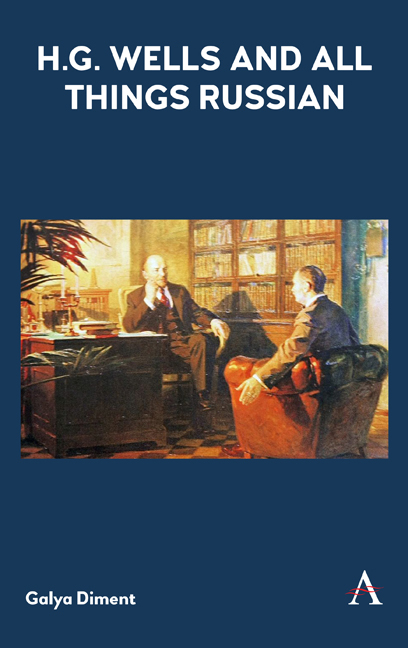Book contents
- Frontmatter
- Dedication
- Contents
- List of Illustrations
- Acknowledgments
- List of Contributors
- A Note on Transliteration
- Introduction: “The Wells Effect”
- Part One WELLS IN RUSSIA: PRE-WORLD WAR II
- Part Two WELLS IN RUSSIA: POST-WORLD WAR II
- Part Three RUSSIA IN WELLS
- APPENDIX TRANSLATIONS
- Appendix 1 V. D. Nabokov on Visiting H. G. Wells in England in 1916 (From Iz voiuiushchei Anglii, 41–51)
- Appendix 2 Alexander Amfiteatrov on Wells's 1920 Visit to Russia
- Appendix 3 Alexander Belyaev on the Wells-Lenin Debate about “Utopias”
- Appendix 4 Karl Radek and Solomon Lozovsky to Stalin
- Appendix 5 Yury Olesha on His Love for H. G. Wells (In Literaturnyi Kritik 12 (1935), 156–7)
- Appendix 6 Yuly Kagarlitsky on Being a Soviet Biographer of Wells
- Bibliography
- Wells, Herbert George – Works Index
- General Index
Appendix 2 - Alexander Amfiteatrov on Wells's 1920 Visit to Russia
from APPENDIX TRANSLATIONS
Published online by Cambridge University Press: 06 September 2019
- Frontmatter
- Dedication
- Contents
- List of Illustrations
- Acknowledgments
- List of Contributors
- A Note on Transliteration
- Introduction: “The Wells Effect”
- Part One WELLS IN RUSSIA: PRE-WORLD WAR II
- Part Two WELLS IN RUSSIA: POST-WORLD WAR II
- Part Three RUSSIA IN WELLS
- APPENDIX TRANSLATIONS
- Appendix 1 V. D. Nabokov on Visiting H. G. Wells in England in 1916 (From Iz voiuiushchei Anglii, 41–51)
- Appendix 2 Alexander Amfiteatrov on Wells's 1920 Visit to Russia
- Appendix 3 Alexander Belyaev on the Wells-Lenin Debate about “Utopias”
- Appendix 4 Karl Radek and Solomon Lozovsky to Stalin
- Appendix 5 Yury Olesha on His Love for H. G. Wells (In Literaturnyi Kritik 12 (1935), 156–7)
- Appendix 6 Yuly Kagarlitsky on Being a Soviet Biographer of Wells
- Bibliography
- Wells, Herbert George – Works Index
- General Index
Summary
In Russia in the Shadows, Wells writes in connection with his 1920 visit: “At a gathering of literary people in Petersburg [sic], Mr. Amphiteatroff, the well-known writer, addressed a long and bitter speech to me. He suffered from the usual delusion that I was blind and stupid and being hoodwinked. He was for taking off the respectable-looking coats of all the company present in order that I might see for myself the rags and tatters and pitiful expedients beneath. It was a painful and, so far as I was concerned, an unnecessary speech, but I quote it here to emphasize this effect of general destitution” (RS, 31). Alexander Amfiteatrov (1862– 1938) was indeed a popular writer, literary critic and journalist. He held strong nationalist views, which made him a dissident in the tsarist regime as well. In 1916, he was exiled to Western Siberia for his published attacks on the government but returned after the 1917 February Revolution. Soon after Wells's visit, he emigrated abroad, first to Prague and then to Italy, from where he contributed to many European émigré newspapers and journals. These memoirs appeared in September of 1922 in Novaia russkaia zhizn’ (New Russian Life), a Russian émigré daily published in Germany.
H. G. Wells in Petrograd
I have not yet seen Wells's book about his visit to the Soviet Russia, and therefore I have no right to express any opinion about it. Bolshevik officialdom publications have cited triumphant passages, from which it follows that Wells supposedly depicted “the Socialist Fatherland” using the most superlative terms to present it as some inevitable future paradise. But quotations by Bolsheviks are an unreliable source: V. Bystriansky and company, adjusting to their needs, would manage to turn not just Wells's writing but “Pater Noster” itself to their advantage and would brazenly assert that “Give us today our daily bread” is an instruction to Europe to feed the RSFSR government and its Red Army exclusively through the Soviet official agencies, and that “And forgive us our debts” means “don't you ever hope to have those Russian debts paid off.”
- Type
- Chapter
- Information
- H. G. Wells and All Things Russian , pp. 181 - 190Publisher: Anthem PressPrint publication year: 2019



